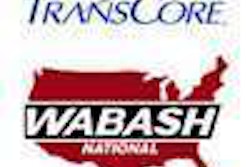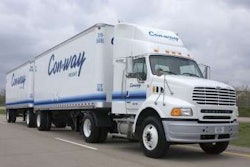Ruling reverses district court’s denial of injunction
The U.S. Court of Appeals for the Ninth Circuit last month delivered a major victory to the American Trucking Associations in its ongoing litigation against the ports of Los Angeles and Long Beach. A three-judge panel ruled that the federal district court should have granted ATA’s request – at least in part – for an injunction against the concession agreements in place at the ports.
“In short, motor carriers should not be required to adhere to the various unconstitutional provisions in the Ports’ agreements, and are likely to suffer irrevocably if forced to do that or give up their businesses,” the court’s opinion said. The appeals court left open the possibility, however, that the federal district court could leave portions of the concessions in place while enjoining other pieces of the agreements.
The appeals court particularly was troubled by the Port of Los Angeles’ concession agreement, saying it is “the most disruptive and is likely to cause the most harm.” The key difference between the two is that the Los Angeles concession agreement forces motor carriers to phase out their use of independent contractors.
If the Port of Los Angeles proceeded with that measure pending litigation, “the carrier will be forced to incur large costs which, if it manages to survive those, will disrupt and change the whole nature of its business in ways that most likely cannot be compensated with damages alone,” the appeals court ruled.
A key question in the litigation is whether the ports’ concessions fall within the safety regulatory exception of the federal motor carrier preemption law. Regarding the Port of Los Angeles’ claims in support of its phase-out of independent contractors, the appeals court declared, “We see little safety-related merit in those thread-paper arguments, which denigrate small businesses and insist that individuals should work for large employers or not at all.” The Los Angeles concession also includes an on-street parking ban, which the appeals court said is unlikely to be “genuinely responsive to safety.”
Both concession agreements require numerous financial disclosures from motor carriers, including annual reports, Securities and Exchange Commission filings, balance sheets, income tax statements and pending legal actions. The appeals said it was unlikely that the financial disclosure requirements in both ports’ agreements could be justified “under any conceivable safety rationale.” The court likewise faulted a provision in the Port of Long Beach agreement requiring motor carriers to notify drivers of available health insurance. “Again, this has no discernable safety purpose.”
As of Oct. 1, 2008, any motor carrier out of compliance with a port’s concession agreement had been barred from entering that port, a situation ATA argued has caused motor carriers to suffer both short- and long-term capital losses and injuries to business goodwill. ATA had not challenged the ports’ Clean Truck Program (CTP), which bans older trucks and uses a container fee to subsidize the purchase of newer, cleaner trucks.
Trucking sheds 33,400 jobs in February
Payroll employment in the for-hire trucking industry plunged 2.5 percent in February from January on a seasonally adjusted basis when 33,400 employees lost their jobs, according to preliminary figures released last month by the Bureau of Labor Statistics. With a contracting manufacturing sector and continued declines in housing starts, key drivers of trucking activity are in severe decline.
The rate of decline far exceeded that of the 0.5 percent employment decline in the overall economy. Trucking employment was down 1.8 percent in January, 1.3 percent in December and just less than 1 percent in November; each decline was the highest recorded monthly percentage drop at the time except for April 1994 during a Teamsters strike.
Since October, trucking employment is down 6.4 percent. Trucking employment is down 11.8 percent from its peak of 1.45 million in January 2007, according to BLS figures. The 1.28 million trucking employees in February was the lowest number of employees in the industry since the end of 1996.
Hours rules challenged in court
As expected, the Federal Motor Carrier Safety Administration faces its third legal challenge this decade regarding its hours-of-service regulations. Public Citizen, the Advocates for Highway and Auto Safety, the Truck Safety Coalition and the Teamsters Union filed a petition March 9 with the U.S. Court of Appeals for the District of Columbia Circuit for review of FMCSA’s Nov. 19 final rule, which formally retained the rules already in place.
The March 9 court filing was procedural and doesn’t state the case against the regulations. However, the arguments of the plaintiffs are clear from past comments and from a letter they sent U.S. Transportation Secretary Ray LaHood on the same day. In that letter, the groups recounted some of the findings of the federal appeals court in 2004 and 2007 when it invalidated the hours-of-service rules in place at the time. They called on USDOT to “direct FMCSA to commence a new HOS rulemaking without delay.”
The Bush administration’s Nov. 19 publication of the hours rules came in just under the wire in order to avoid the moratorium on rules declared by the Obama administration, as well as possible congressional action to negate them.
FMCSA took action on the last full working day before President Obama’s inauguration to ensure that the new administration would not be able to easily undo the final hours regulations. In a Jan. 16 letter to several organizations, FMCSA stood by its decisions to retain the 34-hour restart and 11 hours of driving, saying that there had been ample scientific evidence backing the safety of the regulations.
The four safety advocacy groups, which on Dec. 18 had filed a petition for reconsideration, had 60 days after the Jan. 16 denial to file for a review of the decision by the D.C. appeals court. The Obama administration also could initiate its own reconsideration of the hours rules, but it would have to start over from the beginning with a notice of proposed rulemaking.
While Public Citizen and its allies may be looking for a broad reconsideration of the hours rules by the Obama administration, its legal challenge before the appeals court concerns two provisions: the increase in driving time to 11 hours from the previous 10, and the 34-hour restart of cumulative driving hours. The 2007 appeals court ruling never addressed the merits of those two issues; rather, the court concluded that FMCSA had not given sufficient opportunity for the public to comment on its methodology.
The American Trucking Associations on March 12 filed a motion to intervene in the lawsuit. Having participated in the administrative process and the prior court cases, ATA says it seeks the right to intervene to protect the interests of its motor carrier members.
The court ordered that parties submit certain documents by April 20 and May 4 and deferred briefing in the case pending a further order.
Schneider National backs new fuel surcharge option
Schneider National said last month that it has endorsed FuelSurchargeIndex.org, a fuel surcharge mechanism from ProMiles Software Development Corp., as an alternative to other sources of fuel prices for surcharges, such as the Energy Information Administration’s weekly retail average.
“The best fuel surcharge program offers neutrality for both the shipper and carrier, low cost of administration, verifiable and auditable data, and a direct link to the day and route of a load,” says Mark Rourke, president of transportation services at Green Bay, Wis.-based Schneider National.
Instead of the U.S. Department of Energy’s weekly average, which is based on pricing at 350 representative truckstops, FuelSurchargeIndex.org provides shippers and carriers with fuel prices at more than 5,500 truck stops that are updated every 24 hours and specific to the route that a load actually is traveling, ProMiles says.
U.S.-Mexico program finally ends
After about two years of often-intense political and legal wrangling, Congress last month finally pulled the plug on the pilot program that allowed expanded access to the United States by a limited number of Mexican carriers. The ban took effect on March 11 when President Obama signed into law the omnibus appropriations bill continuing funding for the federal government through the end of this fiscal year. The Federal Motor Carrier Safety Administration confirmed the March 11 termination in a March 18 notice in the Federal Register.
Congress previously already had banned funding “to establish” a cross-border pilot program, but the U.S. Department of Transportation under the Bush administration had contended that this prohibition did not apply to the program that it already had established in September 2007. Litigation over USDOT’s interpretation has been pending in the U.S. Court of Appeals for the Ninth Circuit for more than a year.
Without any worry about facing a presidential veto, Congress was free to enact a much stronger prohibition as part of the legislation necessary to fund the government through Sept. 30 of this year. The measure left no doubt as to the intent of Congress that the existing program should end:
“[N]one of the funds appropriated or otherwise made available under this Act may be used, directly or indirectly, to establish, implement, continue, promote, or in any way permit a cross-border motor carrier demonstration program to allow Mexican-domiciled motor carriers to operate beyond the commercial zones along the international border between the United States and Mexico, including continuing, in whole or in part, any such program that was initiated prior to the date of the enactment of this Act.”
Because opening the border is an obligation under the North American Free Trade Agreement, the Mexican government responded to the termination of the cross-border demonstration program by announcing plans to impose tariffs on certain U.S. imports. Even before that announcement, however, Obama had asked the Office of the U.S. Trade Representative to work with Congress, USDOT, the State Department and Mexican officials to establish a new program that satisfies both congressional concerns and NAFTA commitments.
The Bush administration last August – during a congressional recess – extended the cross-border project for another two years; it originally had been touted as a one-year pilot. One of USDOT’s reasons for granting the extension was that political and legal uncertainty over the program’s future had led to little participation by either U.S. or Mexican carriers. USDOT’s Office of Inspector General’s final report on the program, released Feb. 6, echoed past remarks that it had insufficient participation to provide statistically reliable results to evaluate it fully. USDOT, which received the report in December, mostly concurred with OIG’s assessments.
For a copy of the notice officially terminating the pilot program, as well as more than 2,400 documents and comments regarding it, go to www.regulations.gov and search Docket No. FMCSA-2007-28055.
– Avery Vise
EPA to offer clean diesel grants, loans
The U.S. Environmental Protection Agency last month issued solicitations for more than $200 million in grants and loans under several separate programs aimed at reducing emissions from diesel engines. Congress included $300 million in funding for diesel emissions reduction in the American Recovery and Reinvestment Act – more commonly known as the economic stimulus package.
Most of the funds – $156 million – are dedicated to grants to be awarded competitively under the national clean diesel funding assistance program. Another $30 million will go to the SmartWay Clean Diesel Finance Program, which will support the creation of national, state or local innovative clean diesel financial programs. Such programs include those where the loan recipient receives a unique financial incentive – such as better-than-regular market rates or conditions – for the purchase of retrofitted vehicles or equipment. Another $20 million will go for emerging technologies grants, while the remainder of the $300 million will be administered by states.
Under both the national clean diesel and the SmartWay programs, the grants or loans will be distributed through government agencies with jurisdiction over transportation or air quality or through nonprofit organizations that represent or assist entities that operate diesel fleets. The funds can be used on numerous types of diesel-powered equipment, including medium- and heavy-duty trucks. Under both programs, funding is restricted to the use of diesel emissions reduction technologies certified or verified by EPA or the California Air Resources Board.
Eaton Corp. has established a program to assist diesel truck fleet owners in applying for grants under the EPA programs to help purchase hybrid trucks. Funding is available under the stimulus act for up to 25 percent of the cost of a new hybrid truck. Eaton points out that fleets obtaining grants also can take advantage of federal tax credits for purchasing hybrids.
For more information on the three assistance programs, go to www.grants.gov and search by funding opportunity number: National clean diesel financial assistance (ARRA-OAR-OTAQ-09-06); SmartWay (ARRA-OAR-OTAQ-09-04); and national clean diesel emerging technologies (ARRA-OAR-OTAQ-09-05).
For more general information on EPA’s DERA program, go to www.epa.gov/cleandiesel. To request additional information about Eaton’s program, e-mail [email protected].
In Brief
Employee Free Choice Act – also known as the “card check” bill – was introduced in both the House and Senate on March 10. H.R. 1409 and S. 560 would allow union organizers to gather unionization votes openly without a secret-ballot election. Most business groups, including the American Trucking Associations, strongly oppose the legislation, and the U.S. Chamber of Commerce has declared that defeating card check is its No. 1 priority. As of late March, the bills had 39 co-sponsors in the Senate and 223 co-sponsors – a majority – in the House.
Freight Transportation Services Index fell 2.3 percent in January from its December level, falling for the third consecutive month to its lowest level in more than five years, the U.S. Department of Transportation’s Bureau of Transportation Statistics reported. The January decline was the fifth monthly decrease in six months.
Americans drove 7 billion fewer vehicle miles in January 2009 than in the same 2008 month, the Federal Highway Administration said. The 3.1 percent drop is the first back-to-back decline for the month of January since 1981-1982, the agency noted. The decline in rural driving in January 2009 outpaced the drop in urban driving.
Virginia Department of Transportation plans to close 25 of its 41 interstate highway rest areas due to budget and staffing cuts. American Trucking Associations President Bill Graves called the move “simply beyond comprehension” because the rest areas are important for the safety of average motorists as well as professional truck drivers.
Alabama Gov. Bob Riley signed into law a bill that creates new penalties and fines and increases others for companies and drivers who fail to follow federal securement guidelines for hauling steel coils. Drivers who drop loads face up to a year in jail, plus fines. Drivers whose loads are found to have securement violations without an accident can be fined up to $5,000. The law also mandates certified training for drivers who haul these coils, and allows for fines of up to $10,000 for companies that fail to properly train and certify its drivers.
California Air Resources Board last month released a proposed regulation that would establish a low-carbon fuel standard. The regulation, which is slated to be considered by CARB on April 23, would attempt to reduce the greenhouse gas emissions from California’s transportation fuels by 10 percent by 2020 and more thereafter.
Chris Patterson will retire June 1 as head of Daimler Trucks North America (DTNA) and will be replaced by Martin Daum, who currently is head of operations at the Mercedes-Benz plant in Woerth, Germany. Patterson has worked in the commercial vehicle industry for 32 years, 11 of which were spent at DTNA.
Federal Motor Carrier Safety Administration last month released the findings from three onboard safety system studies that it sponsored. The research, led by the American Transportation Research Institute, provides detailed examinations of motor carrier benefits and costs associated with roll-stability control systems, forward-collision warning systems and lane-departure warning systems. The reports are available online at
www.atri-online.org.












